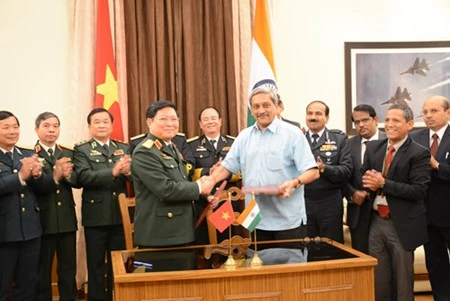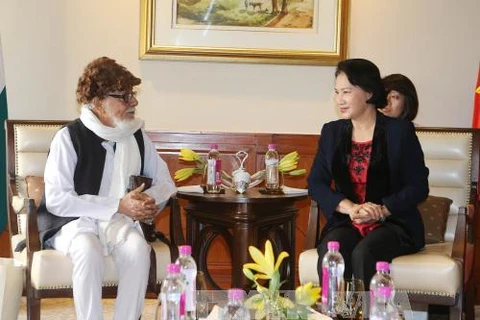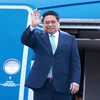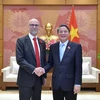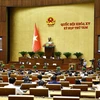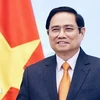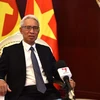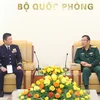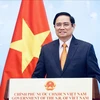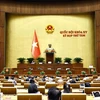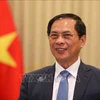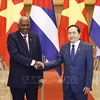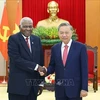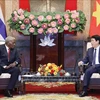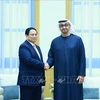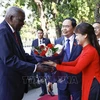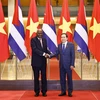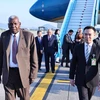 National Assembly Chairwoman Nguyen Thi Kim Ngan (L) meets with Indian Prime Minister Narendra Modi (Photo: VNA)
National Assembly Chairwoman Nguyen Thi Kim Ngan (L) meets with Indian Prime Minister Narendra Modi (Photo: VNA)He said the visit, which lasted from December 8-11, helped concretize the comprehensive strategic partnership established during Indian Prime Minister Narendra Modi’s visit to Vietnam in September this year. It contributed to reinforcing and expanding the multifaceted cooperation between the two countries at a time when they are celebrating the 45th anniversary of diplomatic ties (1972-2017) and 10th anniversary of strategic partnership (2007-2017).
The signing of an agreement between the two countries’ parliaments on this occasion will also create a legal framework for the two law making bodies to boost their ties, the deputy minister said.
While highlighting the time-honoured friendship between Vietnam and India, Deputy Minister Ngoc pointed to bright prospects of bilateral ties, with the elevation of the bilateral strategic partnership to a comprehensive strategic partnership creating a strong momentum for cooperation across the fields.
In addition, the high political trust between the two countries provides a favourable environment for not only political-diplomatic and security-defence ties but also economic, trade and investment collaboration to grow, he said, noting that India is one of the top 10 trade partners of Vietnam with two-way trade seeing an annual average growth of 16 percent and surpassing 5 billion USD in 2015.
India expects to become the biggest foreign investor in Vietnam once Tata group launches its 2 billion USD Long Phu thermal power plant in the southern province of Soc Trang.
Both nations are effectively coordinating to exploit oil and gas in Vietnam’s continental shelf while actively working together to explore new oil and gas fields in Vietnam and third countries, he said.
Deputy Minister Ngoc underlined defence-security cooperation as a strategic pillar in the bilateral relations, with India providing preferential credit packages to Vietnam to help the country improve defence capacity and sharing experience in UN peacekeeping activities.
Chairwoman Ngan’s visit also gave a boost to cooperation in science-technology, education and training, and culture, with a number of agreements signed in the use of nuclear power for peaceful purpose, among others.
India is providing about 150 scholarships for Vietnamese students through the Indian Technical and Economic Cooperation (ITEC) programme as well as technical support in computer and hi-tech fields.
The scheduled launch of direct flights between Hanoi, Ho Chi Minh City and New Delhi in July 2017 is expected to help promote tourism and people-to-people exchanges between the two countries, he added.
The diplomat also stressed that Vietnam always supports the Act East policy of India while India considers Vietnam a key pillar in this policy.
As a coordinator of ASEAN-India relations in 2015-2018, Vietnam is willing to help India forge connectivity with other Southeast Asian countries, he said.
Vietnam also appreciates India’s viewpoint regarding the maintenance of peace, stability, security, safety and freedom of aviation and navigation in the East Sea, as well as respect for diplomatic negotiations and international law, including the 1982 UN Convention on the Law of the Sea (UNCLOS).
Deputy Minister Ngoc said Vietnam supports India to become a permanent member of an expanded UN Security Council and recognises India’s remarkable contributions at international forums such as ASEAN-India, East Asia Summit (EAS), Asia-Europe Meeting (ASEM), Mekong–Ganga Cooperation, Non-Aligned Movement, South-South Cooperation, Mekong–Ganga Cooperation, and India’s efforts to step up the Regional Comprehensive Economic Partnership (RCEP)./.
VNA

